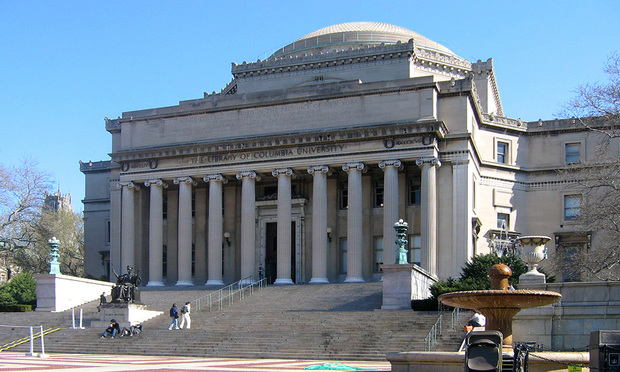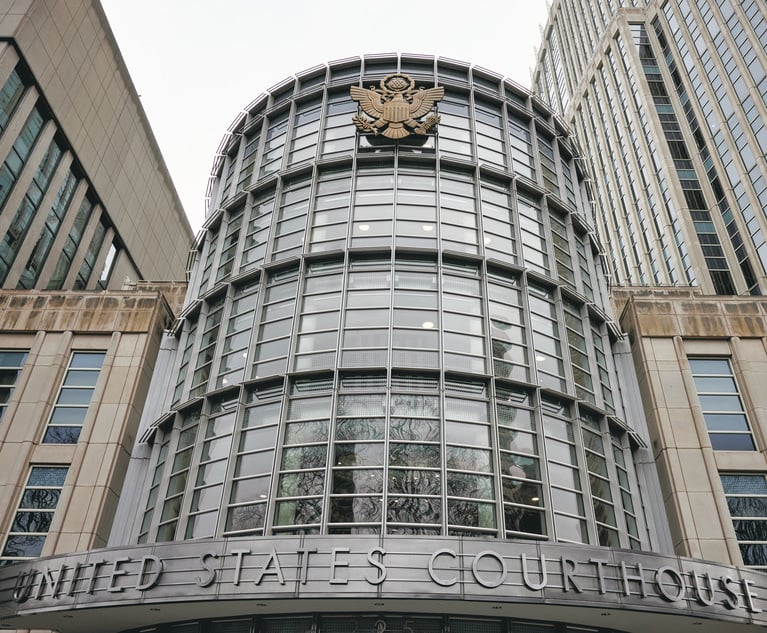Suspended Student Fails at Challenges to Columbia University Disciplinary Process
The student attacked Columbia's hearing process, challenging the university, for instance, for allegedly not allowing him to have a lawyer or other representative be present and for not allowing him to present live witness testimony.
March 13, 2019 at 05:25 PM
4 minute read
 Columbia University's Low Memorial Library. Photo: AlMare via Wikipedia
Columbia University's Low Memorial Library. Photo: AlMare via Wikipedia
Columbia University's decision to affirm a disciplinary hearing committee's suspension of a biophysics student for one semester after he allegedly forged an exam book was “rationally based and not arbitrary and capricious,” a state appeals court has ruled.
An Appellate Division, First Department panel also found that the university had not acted irrationally when it rejected as “not credible” then-student Sai Bondalapati's explanation for why he had marked up a physiology course test booklet in a certain way.
In the student's legal challenge, filed in 2016 as a petition in Manhattan Supreme Court, he made numerous claims, including some attacking Columbia's hearing process. The claims included the university allegedly not allowing him to have a lawyer or other representative be present and the university not allowing him to present live witness testimony.
His case was yet another legal challenge to a university's hearing and disciplinary process for students. And it arrived at a time when such challenges have been increasingly lodged and reported in the news. Campus sexual assault cases have made most of the headlines, but Bondalapati's challenge to the disciplinary procedure made some arguments that students accused of more serious infractions have made.
In the First Department's opinion issued Tuesday, the panel ruled in the university's favor on every point. It knocked back a host of legal challenges to the university's decision to suspend Bondalapati, including a “due process” challenge, arguments about the sufficiency of the record used by the university and arguments about whether Bondalapati's punishment was shocking or disproportionate. It also knocked down a hybrid Article 78 proceeding and plenary action challenge alleging defamation. Bondalapati's collection of legal challenges and claims were lodged against Columbia University, Columbia University in the City of New York, and a dean of Columbia College.
In 2016, Bondalapati was a Columbia College sophomore biophysics major who had transferred from the University of Virginia and who intended to go to medical school, according to court records. In the spring semester, while enrolled in a general physiology course, he sat for an exam but was displeased with the grade he received, the documents said. In the following weeks, he called multiple meetings with his professor, and at one meeting left behind a test booklet she had already re-graded and that he'd marked up in certain ways, according to court records.
The professor then accused him of academic dishonesty, court records say, and he subsequently appeared at a disciplinary hearing headed by two members of a student conduct committee.
In his Supreme Court filing, he petitioned to annul the university's 2016 determination affirming the hearing committee's suspension of him due to an academic dishonesty finding.
The unanimous panel, in affirming Supreme Court Justice's Barbara Jaffe's 2018 denial of the petition, wrote that Columbia's determination was not arbitrary and capricious, and it noted that Bondalapati had “ample opportunity at the hearing to defend his conduct and explain his actions.”
The panel of Justices Judith Gische, Barbara Kapnick, Troy Webber and Cynthia Kern also wrote that Columbia's “rejection of [Bondalapati's] explanation as not credible was not irrational,” and that “denial of petitioner's internal appeal also was not irrational.”
Columbia's “written policy provided for limited grounds for appeal, none of which availed petitioner,” the panel added.
Bondalapati's due process challenge was “misplaced,” the panel wrote, while adding that “a student at a private university is not afforded the 'full panoply' of due process rights,” citing in part Cavanagh v. Cathedral Preparatory Seminary.
The panel also wrote that Bondalapati's “arguments about the sufficiency of the record before the hearing committee or on the internal appeal are without merit,” and that “there is nothing shocking or disproportionate about the one-semester suspension imposed.”
The panel added that his “defamation claim was correctly dismissed because the subject statements were true … had not been published to any persons outside the university … and were protected by a qualified common interest privilege.”
Daniel Dugan, an associate at Stewart Lee Karlin Law Group in Manhattan, represented Bondalapati. Reached on Wednesday by phone, he declined to comment on the decision.
Susan Friedfel, a principal at Jackson Lewis who is based in White Plains represented Columbia University and related respondent-defendants. She could not be reached for comment.
This content has been archived. It is available through our partners, LexisNexis® and Bloomberg Law.
To view this content, please continue to their sites.
Not a Lexis Subscriber?
Subscribe Now
Not a Bloomberg Law Subscriber?
Subscribe Now
NOT FOR REPRINT
© 2025 ALM Global, LLC, All Rights Reserved. Request academic re-use from www.copyright.com. All other uses, submit a request to [email protected]. For more information visit Asset & Logo Licensing.
You Might Like
View All
The Met Hires GC of Elite University as Next Legal Chief

NY Appellate Panel Cites Student's Disciplinary History While Sending Negligence Claim Against School District to Trial

'No Evidence'?: Big Law Firms Defend Academic Publishers in EDNY Antitrust Case
3 minute read
'Substantive Deficiencies': Judge Grants Big Law Motion Dismissing Ivy League Price-Fixing Claims
3 minute readTrending Stories
- 1MoFo Associate Sees a Familiar Face During Her First Appellate Argument: Justice Breyer
- 2Antitrust in Trump 2.0: Expect Gap Filling from State Attorneys General
- 3People in the News—Jan. 22, 2025—Knox McLaughlin, Saxton & Stump
- 4How I Made Office Managing Partner: 'Be Open to Opportunities, Ready to Seize Them When They Arise,' Says Lara Shortz of Michelman & Robinson
- 5The Intersection of Labor Law and Politics Following the Presidential Election
Who Got The Work
J. Brugh Lower of Gibbons has entered an appearance for industrial equipment supplier Devco Corporation in a pending trademark infringement lawsuit. The suit, accusing the defendant of selling knock-off Graco products, was filed Dec. 18 in New Jersey District Court by Rivkin Radler on behalf of Graco Inc. and Graco Minnesota. The case, assigned to U.S. District Judge Zahid N. Quraishi, is 3:24-cv-11294, Graco Inc. et al v. Devco Corporation.
Who Got The Work
Rebecca Maller-Stein and Kent A. Yalowitz of Arnold & Porter Kaye Scholer have entered their appearances for Hanaco Venture Capital and its executives, Lior Prosor and David Frankel, in a pending securities lawsuit. The action, filed on Dec. 24 in New York Southern District Court by Zell, Aron & Co. on behalf of Goldeneye Advisors, accuses the defendants of negligently and fraudulently managing the plaintiff's $1 million investment. The case, assigned to U.S. District Judge Vernon S. Broderick, is 1:24-cv-09918, Goldeneye Advisors, LLC v. Hanaco Venture Capital, Ltd. et al.
Who Got The Work
Attorneys from A&O Shearman has stepped in as defense counsel for Toronto-Dominion Bank and other defendants in a pending securities class action. The suit, filed Dec. 11 in New York Southern District Court by Bleichmar Fonti & Auld, accuses the defendants of concealing the bank's 'pervasive' deficiencies in regards to its compliance with the Bank Secrecy Act and the quality of its anti-money laundering controls. The case, assigned to U.S. District Judge Arun Subramanian, is 1:24-cv-09445, Gonzalez v. The Toronto-Dominion Bank et al.
Who Got The Work
Crown Castle International, a Pennsylvania company providing shared communications infrastructure, has turned to Luke D. Wolf of Gordon Rees Scully Mansukhani to fend off a pending breach-of-contract lawsuit. The court action, filed Nov. 25 in Michigan Eastern District Court by Hooper Hathaway PC on behalf of The Town Residences LLC, accuses Crown Castle of failing to transfer approximately $30,000 in utility payments from T-Mobile in breach of a roof-top lease and assignment agreement. The case, assigned to U.S. District Judge Susan K. Declercq, is 2:24-cv-13131, The Town Residences LLC v. T-Mobile US, Inc. et al.
Who Got The Work
Wilfred P. Coronato and Daniel M. Schwartz of McCarter & English have stepped in as defense counsel to Electrolux Home Products Inc. in a pending product liability lawsuit. The court action, filed Nov. 26 in New York Eastern District Court by Poulos Lopiccolo PC and Nagel Rice LLP on behalf of David Stern, alleges that the defendant's refrigerators’ drawers and shelving repeatedly break and fall apart within months after purchase. The case, assigned to U.S. District Judge Joan M. Azrack, is 2:24-cv-08204, Stern v. Electrolux Home Products, Inc.
Featured Firms
Law Offices of Gary Martin Hays & Associates, P.C.
(470) 294-1674
Law Offices of Mark E. Salomone
(857) 444-6468
Smith & Hassler
(713) 739-1250






